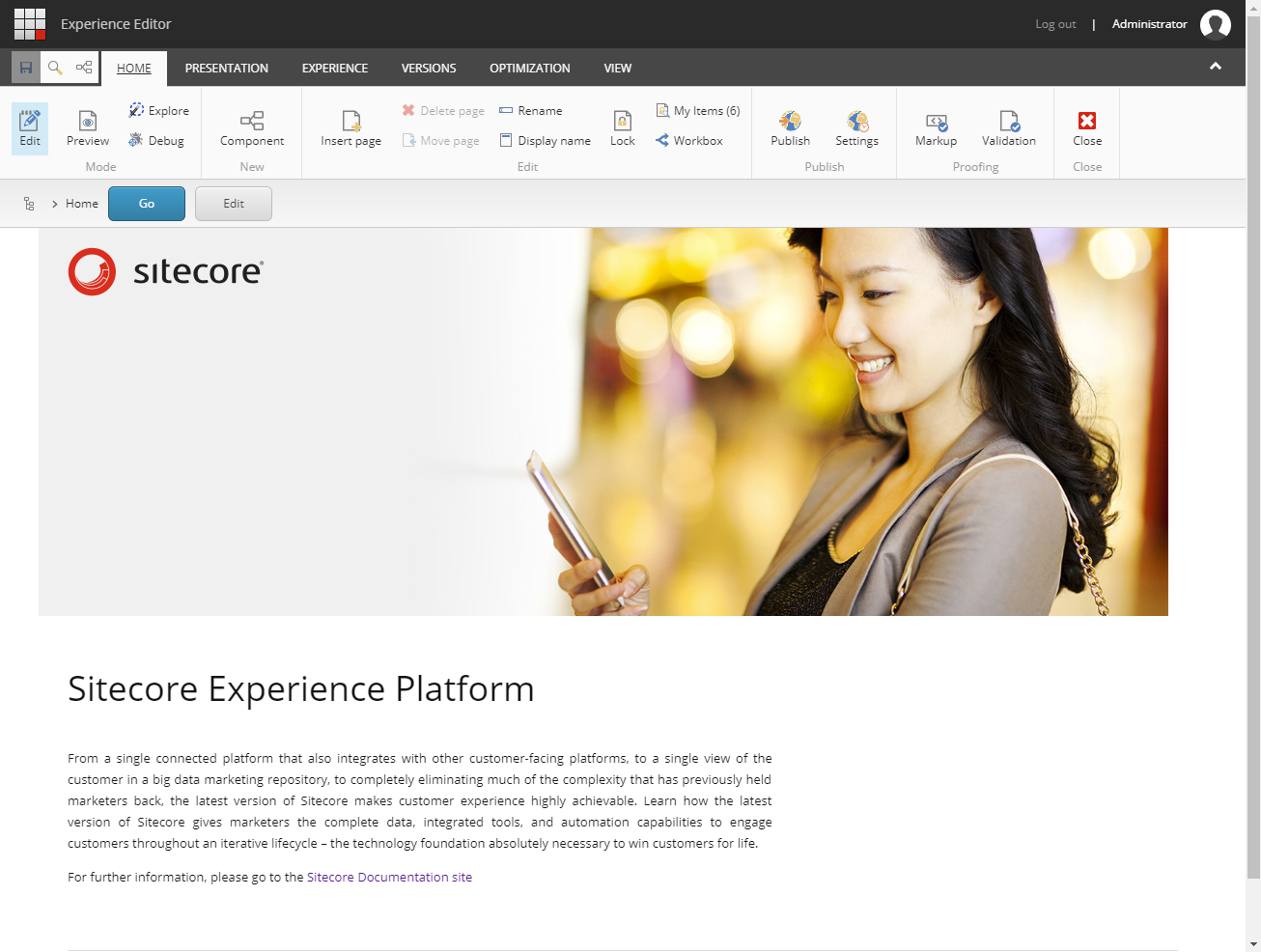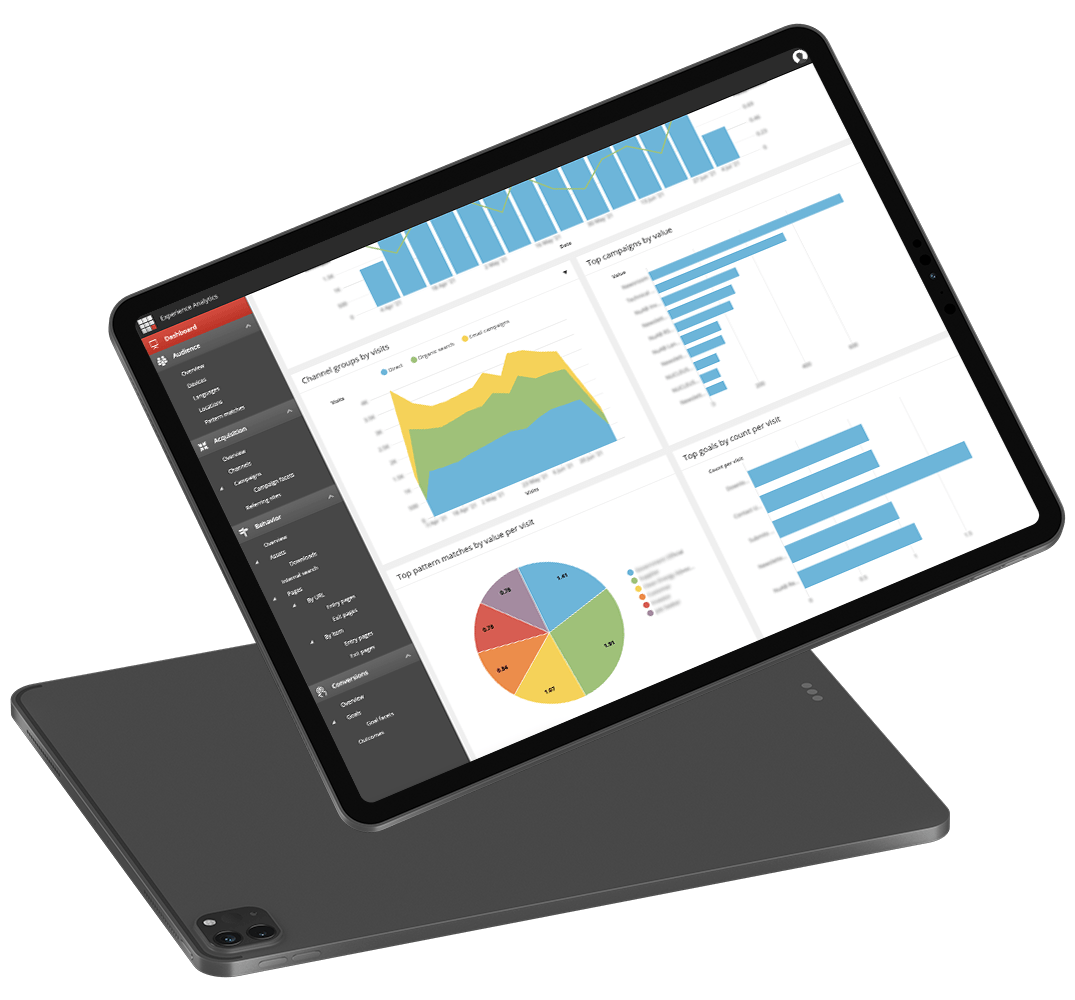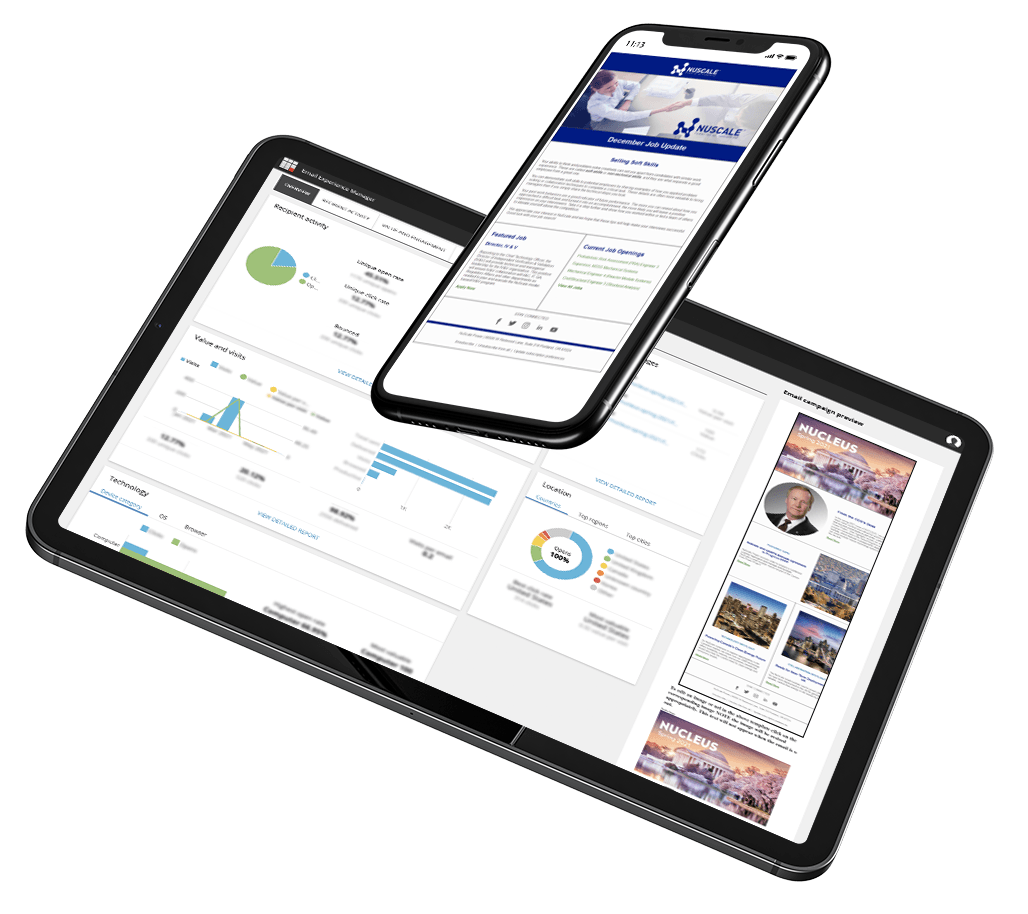Why Sitecore?
Sitecore is an incredible and powerful platform that gives marketers the ability to not only easily update and manage content, but also to personalize the experience for users and optimize their engagement across channels outside the website.
If you aren’t impressed yet, I wanted to walk through some of the things that make Sitecore the best digital experience platform (DXP) out there.
Easy to Use
Despite all the incredible features Sitecore comes with, Sitecore is actually easy to use.
You can perform most everyday admin functions of managing a website and setting up marketing campaigns and personalization without a developer or technical person.
Sitecore also comes with a WYSIWYG editor as well as HTML editors that allow you to build pages no matter your preference.
Website structures are also very intuitive in Sitecore, with all items like pages laid out in an intuitive tree structure and hierarchy, where page names directly influence the URLs.

360 Degree View Of Visitors
Sitecore gives you a 360 degree view of every visitor on your site, in the one place.
You get deep insights and data on their behaviour and their interests, that you can leverage in marketing automation activities or powerful personalization.
You can use both zero, first, second and third party data to uncover insights about your visitors that can help you optimize your content, UX, and even prioritize converting those who are more likely to buy.
You can also connect Sitecore with other apps like your CRM system to share this data with your salespeople or account managers and create the ultimate sales and marketing machine, where your customers are mapped and their needs are identified before they even know them themselves.
Personalization & A/B Testing
Sitecore is the pioneer of personalized digital experiences.
One of the best things about Sitecore is the ability to have your website and content change in real time depending on who’s looking at it, to give every visitor the content that best aligns with their goals and needs, so you can get the most engagement.
In this day and age visitors expect personalized experiences, which has become critical to creating meaningful connections with customers and generating conversions.
Sitecore not only lets you personalize any content on an infinite number criteria (seriously you can personalize on just about ANYTHING), but it also allows you to run A/B and multivariate tests so you can let visitors tell you what content they need, and optimize until you have a website with content that gives the best results.
Sitecore also tracks user behaviour, and categorizes visitors into personas based on the content they’re consuming, which you can then use to run personalization or target with campaigns.
SEO
There’s a lot of CMS and DXP options that perform horribly on search engines.
With visitor distrust of ads and over 3 billion searches performed on Google everyday, having a website that visitors can find through search is paramount.
Sitecore not only performs great on search by default, but it also comes with a lot of features that allow you to easily optimize your site.
For a full list of details, visit my Sitecore SXA SEO Features blog, and my blog about how to set your Sitecore instance up for SEO success.
Marketing Automation & Emails
Sitecore has full marketing automation capabilities with a drag and drop, easy to use interface that allows you to use nearly any rules you can think of as triggers and actions, including a contact’s behaviour on the site.
You can segment contacts into lists, trigger nurture emails and other activities, and send email blasts like newsletters.
Contacts can easily opt in and out of emails through the subscription centre, and you can easily A/B test emails to craft the perfect copy and call to actions.
The email analytics Sitecore comes with ootb are extensive and even show behaviour on the website after a link-click in an email.
Omni-Channel Automation & Insights
Sitecore has powerful tools like Sitecore CDP (customer data platform), that allow you to extend your marketing and analytics capabilities to channels beyond the website.
With Sitecore you can use data from your own or third party systems and apps to trigger automations, segment contact data and unify it in the one place to have a complete view of their customer journey. You can also use their behaviour on other apps and platforms to trigger personalization and drive more loyalty.
Security
Sitecore’s .NET enterprise language makes it secure, robust and a much safer option than an open-source code CMS.
It also has built-in safety features and firewalls.
In addition, Sitecore is committed to security and has implemented security-as-default across their products and services.
They’re committed to keeping customer data secure using industry best practices, and also maintain a number of certifications and security reports including:
Language & Multisite Support
Hosting multiple websites in Sitecore is so easy that all you need to do is add a new page node and update the configuration file to assign the new page node with a domain.
This is great for businesses that want to be able to manage all their websites in the one place.
Multilingual / Multi-Cultural
Sitecore makes multilingual and multi-cultural websites easy by enabling language variations for any number of cultures or languages (e.g. US English), and allowing you to easily implement rules like geo-location to show different language versions to different regions.
You can translate content into any languages, while also keeping certain fields on templates unique or shared (i.e. a logo). Languages can also have their own workflows and version history, and you can easily add new languages.
Mobile Responsiveness
Websites built in Sitecore are developed with a mobile-first mentality in mind.
Sitecore makes this an easy experience for developers and content authors with an integrated responsive web design approach that presents content to users in ways that’s easiest for them to interact with on the device or browser they’re using.
Sitecore’s Experience Accelerator (SXA), comes with a grid system that helps you create responsive websites with consistent designs and cross-browser and app support.
Integration Flexibility
Sitecore can easily be integrated into third-party apps and systems like CRMs or BI dashboards, with native Sitecore Connectors and APIs.
With websites being so ingrained in customer journeys, it’s now become critical for DXPs to integrate easily with other apps that collect data, trigger actions or store information about your customers or users.
Developer Friendly
Sitecore is a blank canvas for developers to build components and go wild with custom rich back and front end development.
The world is your oyster with Sitecore, and if you have a good development partner, anything is possible. Sitecore separates content from its presentation details, giving developers the ability to customize, while also allowing marketers to have control and be agile with their content.
Composable DXP
Sitecore is future focused, defining a new category of DXP - the composable DXP, that allows marketers to build their own experiences in a composable, multi-cloud, low / no code environment.
Sitecore’s Experience Manager Cloud is the most future focused CMS, that will be available in Spring 2022.
To read more about it, read my blog Sitecore’s 2022 Product Roadmap.





